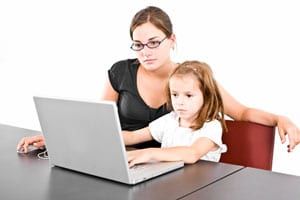Education
Coping With Your Kids' Transition to Home and Online Learning
Support your kids as a loving parent first, as mutual respect guides teaching.
Posted March 29, 2020 Reviewed by Ekua Hagan

The transition from classroom-based to online and other home learning was abrupt and unexpected. We parents, along with our kids and their teachers, are facing new challenges and opportunities. The additional parental role of "teacher" is impacting our relationships with our kids, for better or for worse. Here we'll consider and invite your input about concerns you might have and suggestions for interventions.
Technological and cyber challenges
- Schoolwork requiring computers and internet access can be problematic with adults now working from home, along with siblings having to share limited access. One option is to see if their schools are lending laptops or tablets to families.
- Ask about and share with others what is available in remote technical help from school-based resources.
- Connect in a parent-teacher online community, like PTA at school, with a forum where both teachers and parents can share methods they've found useful—from technical help to website links that make the assigned topics of study come alive.
- Seek out the school or district's recommendations and plans to protect your kids from cyberbullying and guide their access to approved/supervised websites and communications.
Kids and your own emotional responses
Kids are already stressed by the disruption in their world and lives. They can feel frightened by this crisis and anxious from the tension they feel around them. Keep in mind that they are not trying to be uncooperative, lazy, or negative. It's their brain doing what it is programmed to do when high-stress emotions are activated.
The brain's survival response to stress is to react... fight, flight, freeze, or in kids—act out or zone out. These may be seen and interpreted as defiance, opposition, and arguments, but it is their young brains going into a survival "reactive" mode, as opposed to the more thoughtful, aware emotional state they have at their best times.
Things related to school at home that can stress kids' brains' reflective emotional management may include frustration from not understanding the information or the stress of boredom if they have to work on assignments they have already mastered. When the stress response builds, we start seeing more negative reactive behavior, such as excessive arguments, refusals, opposition, defiance, or withdrawal, and it is not unusual for some kids to fall further and further behind.
As your kids are experiencing detachment from their normal school routines, ask teachers for accommodations and consider your own interventions (and opportunities) to make your kid's learning experiences more personalized to their strengths, interests, and skill level. For example, find out the goal of an assignment that your child resists. If the goal is grammar and spelling, certainly writing should be in the correct form, but if the goal is to learn about a time in history by writing about it, consider more options. If they can get into the knowledge by dictating a story or making a comic strip that demonstrates their understanding of the goal, here is a chance to get them more excited by personalizing the way they reach the learning goal. Most teachers are pleased to partner with parents and students on alternatives, and perhaps now there is more time for these connections online.
Your school likely has links that make specific and high-interest virtual connections to assignment topics, such as Google Earth's Virtual Tours of America's National Parks.
Social isolation from the lack of face-to-face interactions with others and the loss of the motivating influence of direct interaction with teachers and classmates in a physical learning community is another stressor. Phone calls, emails, Zoom, Skype, or Facetime, etc. sessions with the class or classmates can be powerfully grounding.
You can help with your understanding and explanation about their brains' stress reaction taking over in response to feeling confused, upset, very frustrated, or frightened. They will feel less stress to know that you are not blaming them.
Links to articles about discussing this topic with kids include:
- "A Brain-Owner's Manual: How to Boost Your Child's Brain Power"
- "Unlock Teen Brainpower: 20 Keys to Boosting Attention, Memory, and Efficiency"
When it comes to stress and emotional self-management, mindfulness practice and building can become a family opportunity. Examples include the book, 10 Mindful Minutes: Giving Our Children—and Ourselves—the Social and Emotional Skills to Reduce Stress and Anxiety for Healthier, Happy Lives, by Goldie Hawn.
Relationship impacts
It is certainly reasonable to feel frustration and uncertainty as you are thrust into the parent-teacher-supervisor role. The best plan is to support your kids as their loving parents first. Then, let them know you are on a learning journey together with them and that you will no doubt make mistakes. By emphasizing mutual respect and collaboration, the teacher part will feel more comfortable for you and your kids.
There will be friction and times when their resistance will smack up against your frustration, but take these opportunities to step back. Learn and grow together during these potentially powerful moments for you to focus the attention on your relationship. What went right until something went wrong? What do you both think might make the next time better?
Also, be clear from the teachers' instructions when you should be assisting your child and working together, and for which assignments they should be independent and communicate directly with the teacher. Find out what feedback/grades/corrections they will be getting, and when you should review and comment on their work. It is great to have a balance, rather than be unclear and feel you must step in constantly... at the expense of your own time and sanity.
What do you miss most as a result of your kids not going to school?
Let's share our ideas, challenges, and suggestions as we navigate the new frontiers of our homes also being our kids' classrooms with us as teachers. What can parents do to help navigate the new challenges of facilitating kids' online learning? What are the impacts on relationships? What are the potential upsides? What do you miss most as a result of your kids not going to school? What do you enjoy most about them not going to school?
Be as kind to and patient with yourself as you want to be with your kids
In your new role as parent-educator in these unchartered times, you'll be drawing upon the best of your flexible thinking, emotional wisdom, and creativity. Experiencing your steady support, even though setbacks and arguments, will sustain your kids through the challenges of today and beyond. With confidence in your patience and respect, they'll build their knowledge, as well as stronger resilience and self-reliance, to take on the unexpected challenges and opportunities the future holds.
In my next blog post, I'll provide more suggestions about boosting homework and assignment interest, motivation, and success for your kids.




